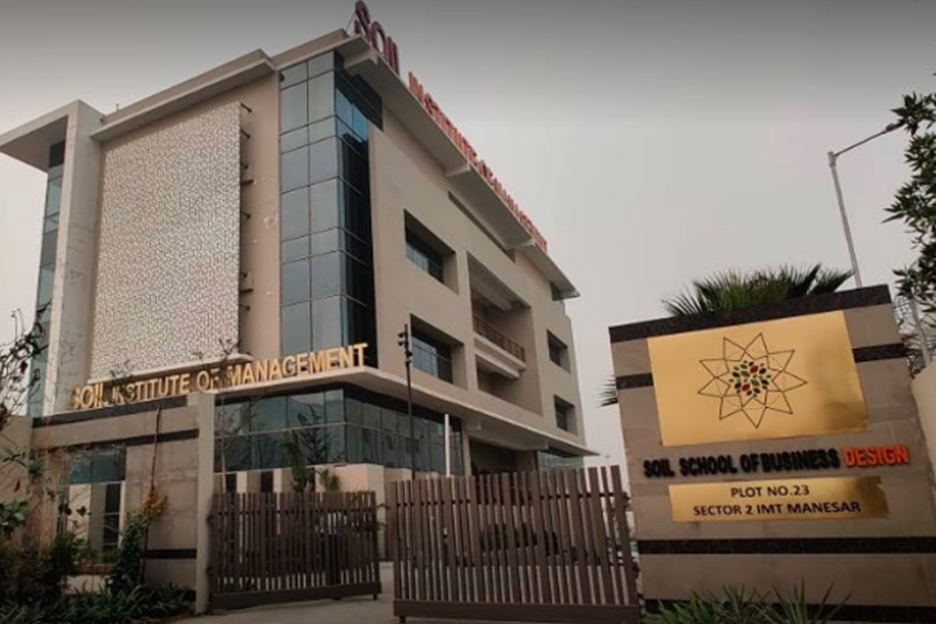
For years we have been dreaming SOIL 2.0. After two years of co-creating the new story of SOIL with hundreds of academics, industry leaders, NGO change makers, Global thinkers, and spiritual masters, we have crafted the 'purpose' of our new offering:
‘To develop inspired leaders who contribute to Human Centered Innovation to make the world better’
The School of Inspired Leadership was co-created by 32 leading Global and Indian firms and a group of Founders that wanted to build leaders with strong character, the competence of ‘holistic thinking’ and the enthusiasm to make a difference in our world. More than 1000 alumni of the one-year full time PG Programs of SOIL are working all over the world and are contributing to making organizations more socially responsible and nourishing for people.
The new campus for SOIL, the SOIL School of Business Design, located in New Gurgaon (Manesar) is building upon this legacy by starting the first of its kind two years full time PGDM in ‘Business Design’.
This has been created to develop leaders who are inspired to make the world better by contributing to ‘human centered innovation’.
The Program has an interdisciplinary curriculum that combines liberal arts with Design Thinking and Management Education.
This is aimed at developing students who are ‘aware’ and have dreams of making organizations and the community better, ‘care’ to take responsibility for their dreams and ‘dare’ to overcome their fears and limitations to execute their plans.
Liberal Arts subjects such as Sociology, Anthropology, Psychology, Indian ethos, Art and Poetry enable students to ‘see the world’ with fresh pairs of eyes as they observe and listen to stakeholders such as the community, customers and employees and helps them to develop ‘empathy’.
Design Thinking such as Interaction Design, Visualization, Product and Service Design develop the student’s capacity to ‘imagine and create’ new ideas to serve the needs of stakeholders that feel through empathy. Management subjects such as Strategy, Marketing, Finance, Operations and HR help students to ‘build’ scalable and sustainable solutions. While combining these three disciplines the design of the PGDM is including deep learning from:
Artificial Intelligence, Machine Learning and Robotics and how they are creating completely new business models and transforming the way organizations and society work and live.
More than 50 percent of the learning is designed to take place outside the classroom through transformational learning experiences. Students will spend one day in a week working on live projects in Industry and the community and undertake:
In the first three months, students would be exposed to new ways of ‘unlearning habits of rote learning’ or learning through memorizing without understanding acquired through school and colleague education and learn new ways of learning based on their natural learning styles. They would be enabled to learn through observation and deep learning, asking new questions with childlike curiosity, applying new insights, reflecting and introspecting on what was enabling them to acquire new capabilities. Each student would be assigned a mentor from Industry and an Internal mentor who would enable students to make progress on their ‘Self Development Plan’. The evaluation of learning will take place not based on competing with class mates but linked to actual learning outcomes seen in action. Our faculty have been carefully identified based on their capacity to learn and ignite the spark of learning in students. They come from global and Indian contexts and have been associated with outstanding business schools, organizations and consulting firms.
Channel your positive energy to discover yourself and leverage your strengths
DOWNLOAD BROCHUREAccelerating the careers of high-potential managers with a specific attention to the Indian context.
DOWNLOAD BROCHUREBuild the personal capacity to purposefully lead in an increasingly complex and volatile global environment
DOWNLOAD BROCHUREAccelerate your development with the right knowledge and skills needed to identify problems, design effective solutions, and adapt to the dynamic global markets.
DOWNLOAD BROCHURE